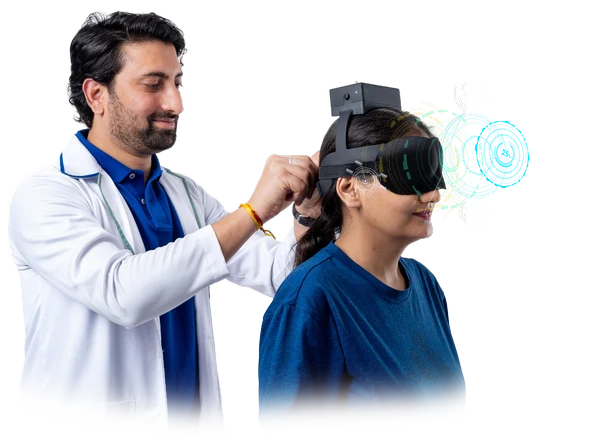


CCG assesses the following protocols to provide a comprehensive evaluation of balance and vestibular function:




NeuroEquilibrium CCG offers a reliable method for doctors to diagnose and understand balance disorders, aiding in effective treatment planning. It also serves as a good tool to monitor the progress of patients on vestibular rehabilitation.
CCG stands for Computerized Craniocorpography in the context of balance and dizziness assessment. It is a diagnostic technique used to evaluate how well a person maintains posture and balance while standing or walking. The test records body movements using sensors, helping clinicians detect abnormalities in the vestibular and postural control systems.
In the hotel and hospitality industry, CCG commonly stands for Corporate Credit Guarantee or Company Credit Guarantee. It refers to an arrangement where a company guarantees payment for stays, services, or bookings made by its employees or clients. This system helps hotels manage billing efficiently while offering credit facilities to corporate customers.
The full form of the CCG test is Computerized Craniocorpography. It is a non-invasive balance test used to assess vestibular and postural function by analyzing body sway and movement patterns. The test is often used alongside other vestibular evaluations at specialized centers like Neuroequillibrium to improve diagnostic accuracy in patients with dizziness or imbalance.
In India, the meaning of CCG depends on the context. In healthcare, it usually refers to Computerized Craniocorpography used in balance diagnostics. In finance or governance, CCG may stand for Credit Guarantee Corporation or similar terms. Understanding the context medical, financial, or corporate is essential to interpret the correct meaning.
CCG service typically refers to the offering of Computerized Craniocorpography as a diagnostic service in balance clinics. It involves conducting the test, analyzing postural data, and providing clinical interpretation. Advanced vestibular centers such as Neuroequillibrium include CCG services as part of a comprehensive evaluation to identify balance disorders and guide appropriate treatment plans.
Corporate Office:
140, Shrigopal Nagar, Gopalpura Bypass Road, Jaipur 302018, Rajasthan, India
Manufacturing Site:
1st Floor, Plot No.3, Pooja Tower, Muktanand Nagar, Gopal pura Mode, Jaipur, Rajasthan 302018
All rights reserved © 2026 NeuroEquilibrium Diagnostic Systems Pvt Ltd.
Vertigo Clinic in Ujjain | Vertigo Clinic in Barwani | Vertigo Clinic in Patna | Vertigo Clinic in Miraj | Vertigo Clinic in Kolhapur | Vertigo Clinic in Nashik | Vertigo Clinic in Jaysingpur | Vertigo Clinic in Amravati | Vertigo Clinic in Solapur | Vertigo Clinic in Pune | Vertigo Clinic in Aurangabad | Vertigo Clinic in Nagpur | Vertigo Clinic in Sagar | Vertigo Clinic in Indore | Vertigo Clinic in Jabalpur | Vertigo Clinic in Bhopal | Vertigo Clinic in Bilaspur | Vertigo Clinic in Ahmedabad | Vertigo Clinic in Vadodara | Vertigo Clinic in Surat | Vertigo Clinic in Navi Mumbai | Vertigo Clinic in Thane | Vertigo Clinic in Mumbai | Vertigo Clinic in Palghar | Vertigo Clinic in Jaipur | Vertigo Clinic in Sriganganagar | Vertigo Clinic in Alwar | Vertigo Clinic in Kota | Vertigo Clinic in Udaipur | Vertigo Clinic in Lucknow | Vertigo Clinic in Prayagraj | Vertigo Clinic in Varanasi | Vertigo Clinic in Gurgaon | Vertigo Clinic in Dehradun | Vertigo Clinic in Rohtak | Vertigo Clinic in Amritsar | Vertigo Clinic in Ludhiana | Vertigo Clinic in Greater Noida | Vertigo Clinic in Delhi | Vertigo Clinic in Kannur | Vertigo Clinic in Trichur | Vertigo Clinic in Cochin | Vertigo Clinic in Coimbatore | Vertigo Clinic in Tiruppur | Vertigo Clinic in Chennai | Vertigo Clinic in Hosur | Vertigo Clinic in Bangalore | Vertigo Clinic in Mangalore | Vertigo Clinic in Hyderabad | Vertigo Clinic in Sangli